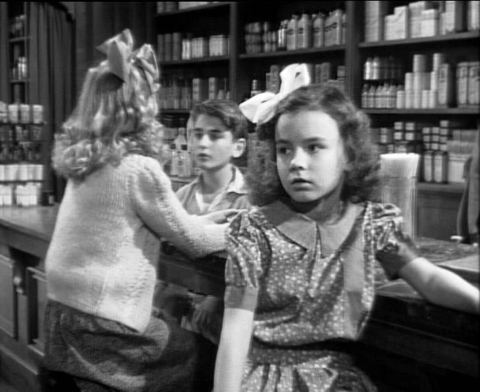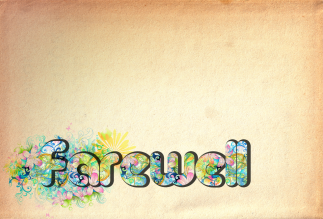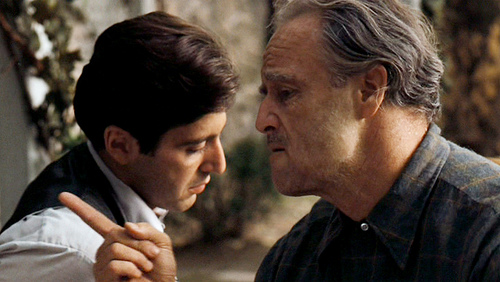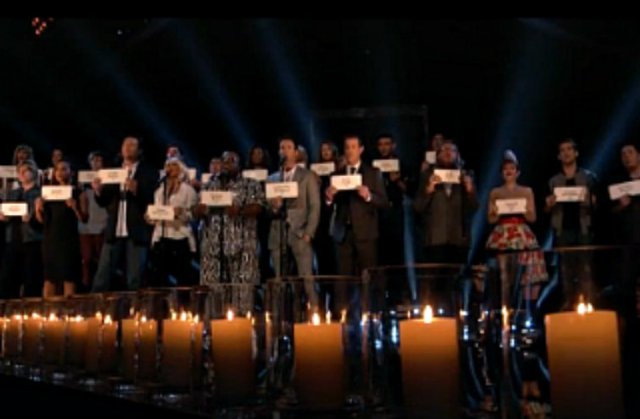“Hee-haw!”

I can’t stay mad at someone who loves his little girl like this.
“I want a big one!”
“My mouth’s bleedin’, Bert! My mouth’s bleedin’!”
“I’m not paying you to be a canary!”
“I wish I had a million dollars. Hot dog!”
“I’ve read about things like this.”
“Out you two pixies go. . . through the door, or out the window.”
“What do you know about that!”
“Say brainless, doncha know where coconut comes from?”
“I’m going to have a couple of harems and maybe three or four wives.”
“We don’t need any characters around to give the joint atmosphere.”
“Hey, Mr. Martini, how bout some wine?”
–All quotes from It’s a Wonderful Life and any given day at my house.
We quote that movie as if my momma wrote it.
There’s something magical about the moment when a wretched Jimmy Stewart, after having reached the depths of despair and having cold-cocked a police officer, runs out on to the frozen bridge and entreats his Holy Guardian Angel: “Help me Clarence! Get me back. I don’t care what happens to me. Get me back to my wife and kids . . . I want to live again!”
There must be something magical going on, because right after his life-affirming proclamation and vociferous entreaty, Bert—who just five minutes prior didn’t know our character from Adam—calls out his name: “George! Hey, George! George! You a’right? Say, whatsa matter?”
Comprehending that he has a second lease on life, our character realizes that, “My mouth’s bleedin’! My mouth’s bleedin’!”
Thus begins one of the most famous redemption scenes in American cinema.
I know I already played my Frank Capra card a few months back with “It’s a Wonderful Q,” but for my last post of the Pagan Blog Project, my last post for 2012, and my penultimate post on The Bad Witch Files before handing the thing over to Hazey and moving the rest of my furniture over to Ehsha Apple, I’d like to tell you why I hate George Bailey more than any other character in film.
And maybe it’s partly because I am more a Cary Grant fan than a Jimmy Stewart fan. Really, my favorite Jimmy Stewart film? Philadelphia Story. And that’s because of Grant and Hepburn and in spite of Steward. Mr. Smith? No thanks. Rear Window and Vertigo? Love them, but that’s a Hitchcock thing. Give me To Catch a Thief, Notorious and North by Northwest any day.
I named my horse Bringing Up Baby, for pete’s sake. I wanted to name another His Girl Friday but was out-voted.[1]
An Affair to Remember leaves me in tears before the first pink champagne.
After Cary Grant? Paul Newman (I would have named the horse Cool Hand Luke as a second option). But that’s beside the point.
JIMMY & GEORGE
Let me back up a minute and tell you that it’s partly because of my aversion to Stewart’s lanky physique and protracted visage as much as I was to his characters’ typical chowderheaded, simple-minded idealism, and reluctant worthiness that I didn’t see It’s a Wonderful Life until I was an adult. Harsh words for one of America’s best loved actors, I know.
My first exposure to the film was in a Christmastime family game of charades where one sister gave the clue, “movie,” paired with the clues, “four words” and “first word=small word,” and the other sister—as sisters do—finished the thought and won the game. I may have been eight or nine at the time. I had heard of the film, but I knew so little that I didn’t even realize it was a Christmas film.
When I met my husband, I learned that It’s a Wonderful Life was his favorite film of all time and that, aside from Bugs Bunny, George Bailey was his favorite character. (And that his life-long bestie and the Best Man of our wedding, replies to compliments with, “This ol’ thing? I only wear it when I don’t care what I look like.”) So, ready to love this incarnation of Jimmy Stewart as much as I loved my then “boyfriend,” I sat to watch the film for the first time in December 1989.
I watched George save his baby brother, I watched him stand up for his father’s honor against the powerful but coldhearted Mr. Potter, I watched him save the grieved but drunken pharmacist, I watched him plan his escape from Bedford Falls from National Geographic and coconut sprinkles to a wish for a million dollars—“Hot dog!”—and his second-hand monogrammed suitcase.
I kinda like George up to that point. I hoped the best for him. I wished Stewart wouldn’t talk like he had a mouthful of mutton, but I  liked George OK. I wanted to see this young man have it all—but, I would learn, the only time Jimmy Stewart makes it to an exotic location, his son gets kidnapped. Que-sera-sera.
liked George OK. I wanted to see this young man have it all—but, I would learn, the only time Jimmy Stewart makes it to an exotic location, his son gets kidnapped. Que-sera-sera.
By the time the kid from The Little Rascals opened the gymnasium floor, thus dunking Mary and George, I knew how the rest of the story would go. And I cry every time—from the school dance to “Auld Lang Syne.” But not because I love the story. Because I am so despondent at George’s fate. It’s the famous “love scene” that breaks me. Over the phone, George tells Sam that isn’t “trying to steal anybody’s girl” and he tells Mary, whose been sidling-up against a celibate (assuming Georgie-Porgie and Violet haven’t gotten “tired of reading about things”) twenty-three year old man while telling him that “it’s a chance in a lifetime,” that he doesn’t “want any plastics and [he doesn’t] want any ground-floors and that [he doesn’t] want to get married ever to anyone.”[2] He makes it more than clear to Mary Hatch, played by Donna Reed, the quintessence of American house wifery, when he says, “I want to do what I want to do!” Four seconds later, he’s kissing her. Seven seconds later, they are married.
George gets trapped in a whirlwind of unwanted domesticity,[3] he get shafted at every turn, and no one ever notices—until it’s too late. His life’s savings goes toward his brother’s education and when Harry comes home from school? He’s got a surprise wife and new job in tow. He may become a war hero, but at this moment, he’s kinda a twat.
George could have been as rich as Sam Wainwright, instead he gave his bridal purse to a dying family institution and ended up without a proper honeymoon and in a “drafty ol’ house” with broken windows and a faulty banister newel.
And a very fecund wife, I might add.
George would carry Mr. Gower’s secret to his grave, yet he was set-up for his demise because of the imprudence of his uncle.
Yes, yes. I know. George makes a big difference in a great many lives. Everyone prays for George. Blah, blah, blah.
In real life, we rarely see folks who make that sort of sacrifice; nine times out of ten, we see folks unwilling to make sacrifices yet still expect a town to ante-up in the pivotal scenes.[4] If you have your hand out for help more often than you offer, you aren’t George Bailey; and you’re not even Mr. Potter—you’re just Bedford Falls.
MARY HATCH, BLACK MAGIC WOMAN
Not unfamiliar with delayed gratification, philanthropy, good works, Matthew 25, deferred-dreams, charity, sacrifice, etc. and the ways in which these acts feed/starve the human soul, I still feel that George Bailey got short-changed. Yes, yes, in the end he’s touted as “the richest man in town” (more on that later). However, it remains that he traded in a life where he called the shots, where he planned his location, and where he held his own hefty pocketbook for a life where coconut-hatin’-stone-throwin’-window-breakin’-Mary Hatch called the shots, where the fruit of Mary’s loins roped him down in one place, and where he ended up financially dependent on the charity of others, including Sam Wainwright: “Hee-haw!”
But that damned Mary Hatch. Now that I’ve memorized the movie from twenty-three years of multiple viewings, I get caught up on  Mary Hatch every time: “George Bailey, I’ll love you ‘til the day I die.”
Mary Hatch every time: “George Bailey, I’ll love you ‘til the day I die.”
Fecking batch.
But even the first time I watched the movie, I knew. I knew. I knew she had cast a binding spell on that poor little sweet-hearted boy and that at that moment she’d lassoed young George with a noose and the albatross of his life.
Not only did she intentionally whisper in his bad ear, she broke windows at the ol’ Granville house where George “wouldn’t live in . . . as a ghost.” George makes a “whole hat-full” of wishes to “[shake] the dust of this crummy little town off [his] feet and . . . see the world.” As he waxes on about the greatness his life will become after college and a great career as an engineer, Mary picks up a rock and casts. Hard. You can see it in her eyes. She’s doing magic. And unlike George, she follows the advice in my “Hush, hush” post and she doesn’t reveal her wish.
Mary Hatch as Bad Witch? Hmmmmm….
I know I’ve pointed out somewhere that my conception of evil magic or “black” magic is that which is done in an effort to bind the will of another. Even if it is done with the supposition of “love,” to bind another to your side—as in a love spell or any spell that binds someone’s loyalties to you, a spell that determines the course of another’s life, their living conditions and location, or a spell that in any way affects the outcome of someone else’s circumstance in a way that benefits the magician—is evil, manipulative, black.[5] That doesn’t mean we don’t all do it from time to time. But, say brainless, this is a shortcoming rather than a strength.
By the time I saw It’s a Wonderful Life, I was about to turn nineteen and was already steeped in the occult. Maybe if I had seen the movie as a kid, or even as an adult with no magic under my belt, I wouldn’t be so hard on Mary.
But I didn’t. And I am.
But back to George.
GEORGE’S WYRD
There’s something about the message that we should be satisfied at living our lives for others. Something about the idea that when it comes time for our “positive wyrd” to show up in the nick of time and plant an old maid’s divorce money on our dining table, we should be overjoyed.
There’s something about the message that argues—if you bleed your life for others and they save you in a *big* moment—even though they’ve been blind to your daily plight for a dozen years—then everything is all well and good and you should just be happy to be alive.
Bull.
Without the George Bailey’s of the world, as the narrative runs, we’d be a mess. Or something like that. To borrow Hazey’s term, I call that hand.[6] I’ve know quite a number of (real) George Bailey’s in my life. Know what? They didn’t get a lump of cash in the end scene—folks anted up for them all year round.
I guess I just feel like that’s how it should be; we should take care of each other all of the time and not just in the eleventh hour of need. I get burned up by the message that we should be joyful at the prospect of having gone around the bowl twice before being flushed down the crapper only to pull a maladroit and wingless angel out of the drain as our salvation. That’s not how it works. When we take care of others, we don’t end up on the chopping block. No one would allow that.
In the end, it’s the moment when George realizes that he has his daughter’s flower petals in his pocket that he is restored to himself and I can convince myself that there is something vaguely redeeming about this film and its main character: “My mouth’s bleedin’ Bert! . . . Zuzu’s petals! Zuzu’s petals!”
Ah, shit.
Living, no matter how torturous, is always a sight better than dying.
[1] I was also Dr. Spinalzo in a high school production of Arsenic and Old Lace. Couldn’t watch the film often enough to suit my taste.
[2] Strangely similar to my own declaration just months before The Husband proposed.
[3] Ken Jennings supports my suspicion that the rapid-fire romance between Mary Hatch and George Bailey after Harry’s return suggests that George’s Buffalo Girls came out tonight, nudge, nudge, knowwhatimean, knowwhatimean.
[4] This brand of selfish egoism may be one thing I dislike more than George Bailey.
[5] I like Poke Runyon’s long-winded and tangential explanation about parents who lock refrigerators so kids don’t get at the foodses, Mi Lai, and sociopaths—he also gets into a discussion about how using sex-magic unbeknownst to your “partner” is unethical to evil, coz duh! (The Hermetic Hour. Evil, Evil Magick, and Evil Magicians.) Basically, if you are out to “exploit, manipulate, or deceive” for your own good, it’s evil. I define manipulate very broadly. So does Frater Thabion.
[6] Looks to me like, despite the FBI’s warning that the Capra film stank of Commie ideals, George Bailey is an invention of post-war American capitalism. The moral of the story is—don’t leave America or the Pottersville-baggers will win and turn the movie house into a strip joint.
Here’s a thing.
Here’s a thing.
Here’s a slightly less interesting thing.
This post is part of a year-long project. Rowan Pendragon’s The Pagan Blog Project; “a way to spend a full year dedicating time each week very specifically to studying, reflecting, and sharing . . . . The project consists of a single blog post each week posted on prompt that will focus on a letter of the alphabet” (http://paganblogproject/).




 liked George OK. I wanted to see this young man have it all—but, I would learn, the only time Jimmy Stewart makes it to an exotic location, his son gets kidnapped. Que-sera-sera.
liked George OK. I wanted to see this young man have it all—but, I would learn, the only time Jimmy Stewart makes it to an exotic location, his son gets kidnapped. Que-sera-sera. Mary Hatch every time: “George Bailey, I’ll love you ‘til the day I die.”
Mary Hatch every time: “George Bailey, I’ll love you ‘til the day I die.”

 (adult) niece removed my comment. My brother and I went tête-à-tête. The crux of his argument was, “If a school is not teaching about God then, by default, it is teaching atheism.”
(adult) niece removed my comment. My brother and I went tête-à-tête. The crux of his argument was, “If a school is not teaching about God then, by default, it is teaching atheism.”

 Aztec goddess Xochiquetzal, from the Codex Borgia
Aztec goddess Xochiquetzal, from the Codex Borgia

